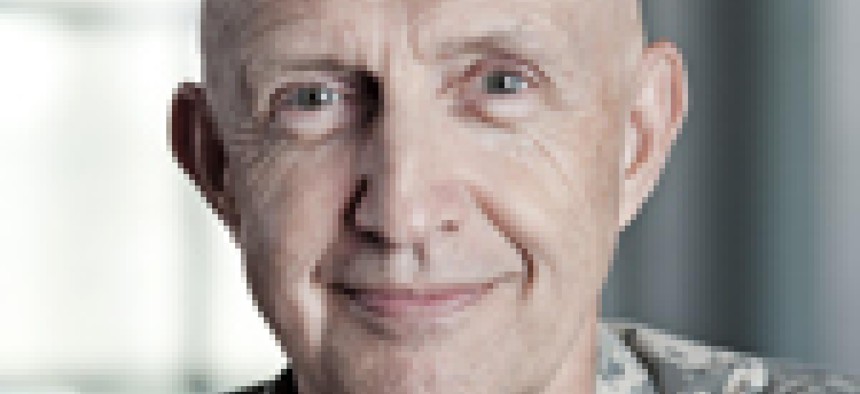A nation at war: Taking tech into battle

Gen. Nick Justice says he was forever changed by his days on the ground early in the U.S. military response to the 2001 terrorist attacks.
Gen. Nickolas Justice lost more than 30 friends and co-workers when American Airlines Flight 77 hit the Pentagon on Sept. 11, 2001. He was almost among them.
Instead, a last-minute change of plans placed him within view of lower Manhattan.
Justice, who at the time was a colonel and program manager of Force XXI Battle Command Brigade and Below (FBCB2), had spent the previous week at the Pentagon and was en route home to Fort Monmouth, N.J., when he was asked to come back to Washington. Frustrated with the confusion, he asked a deputy to go in his place, and Justice returned to New Jersey. That's where he was when the planes hit the towers.
“When the news started breaking, we immediately began making contact with all our folks traveling,” he said. “We spent the day running an operations center, identifying where our people were.”
Although he was eventually able to account for everyone he was responsible for, the attack weighed heavily on him.
“It was a very personal day for me," he said. "I spent many years at the Pentagon, in that very area that was hit. I could have been there having coffee with folks. I lost 31 people that day, folks I had spent many, many years working alongside.”
Instead, he was far enough away from the towers to be safe but close enough to have a tangible sign of the carnage. “I had to wake up on Sept. 12 and dust off my car from the ashes," he said. “It’s a very vivid, personal memory for me.”
The day of the attacks was only the beginning of Justice's Sept. 11 story. His Army career had been rooted in electronic warfare, starting when he was a young enlisted soldier. After becoming a commissioned officer, his background continued to propel him forward in communications, and he went on to help build the Army CIO office, Army Knowledge Online and FBCB2.
So it’s not surprising that Justice was asked in early spring 2003 to help establish a new headquarters command post from which U.S. forces would execute the war in Iraq. What was supposed to be a 10-day trip turned into an 18-month deployment. Justice led the effort to institute and execute Blue Force Tracking, an asset that remains crucial to this day.
Justice and his team operated on a rhythm that consisted of constant work punctuated by 60- to 90-minute naps and four meals a day. It was the early days of the war in Iraq, and they were given a lot of leeway to make decisions — much different from the environment back home.
“The day-to-day distractions that you have at home fade away,” Justice said. “The obstacles you’d find in a bureaucratic process melted away. The operational forces were open to change and adaptation in order to meet their needs.”
As the units started to arrive, Justice spent more time with the brigades, something that began to change his perspective — and inspire him.
“I learned more about our Army and its capabilities than I have in the rest of my career put together,” Justice said. “The strength and agility and the talent we have [are] amazing. The Army was a learning organization, and I came away incredibly proud of that fact and that it could literally adapt and adjust so easily. We just had to put in the sweat equity and determination.”
Today, Justice looks back on the past 10 years with gratitude for having had the opportunity to play an instrumental role in the U.S. response to the terrorist attacks.
“As I walk away from this decade, I couldn’t have pictured where we’d be today,” he said. “One lesson you take away is having confidence in things evolving and in experiencing the journey, not the destination. Everyone wants to get to the end state without taking the journey, but that’s where you adapt, adjust and learn the lessons you need as a soldier — lessons you take with you for the rest of your life.”


